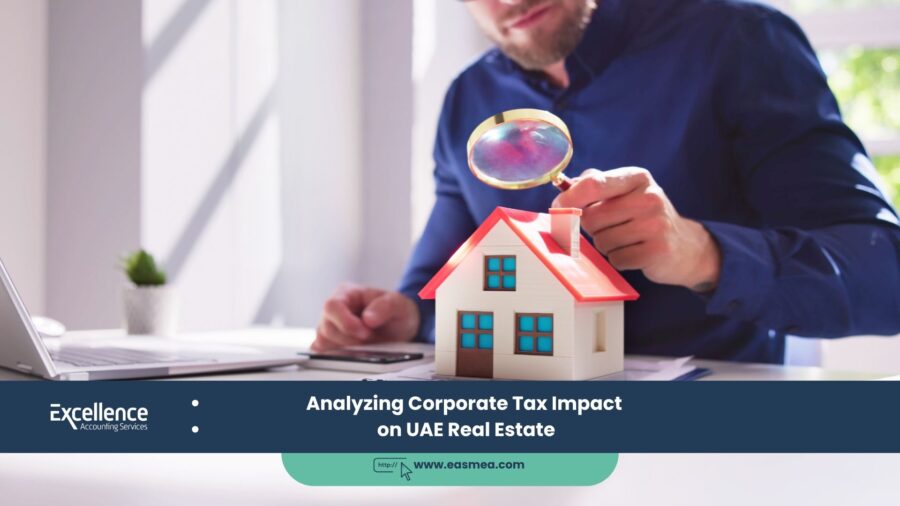Analyzing Corporate Tax Impact on UAE Real Estate
The UAE’s real estate sector, long considered a cornerstone of the nation’s economy and a tax-efficient haven for global investors, has entered a new era with the introduction of the federal Corporate Tax (CT). This landmark legislation redraws the financial map for anyone involved in property development, investment, and management through a corporate structure. The previously straightforward calculations of rental yields and capital gains are now subject to a new layer of fiscal scrutiny, making a deep understanding of the law’s implications essential for maintaining profitability and ensuring compliance.
- Analyzing Corporate Tax Impact on UAE Real Estate
- The Fundamental Distinction: Natural Person vs. Juridical Person
- Dissecting the Impact on Real Estate Revenue Streams
- Impact on Specific Real Estate Stakeholders
- The Critical Role of a Modern Accounting System
- What Excellence Accounting Services (EAS) Can Offer
- Frequently Asked Questions (FAQs)
- Navigate the New Real Estate Tax Landscape with Confidence.
This analysis provides a comprehensive examination of how the UAE Corporate Tax regime specifically impacts the real estate sector. We will explore the critical distinction between personal and corporate property ownership, dissect the tax treatment of rental income and capital gains, and navigate the complexities faced by developers, corporate landlords, and investors. For stakeholders in one of the world’s most dynamic property markets, this guide offers the strategic insights necessary to adapt to the new tax landscape and make informed, tax-efficient decisions.
Key Takeaways for the Real Estate Sector
- Ownership Structure is Paramount: The distinction between a ‘natural person’ (individual) and a ‘juridical person’ (company) owning property is the single most important factor determining tax liability.
- Corporate Rental Income is Taxable: Rental income generated by properties held within a corporate structure is now considered taxable income, subject to the 0%/9% CT rates.
- Capital Gains are No Longer Tax-Free for Companies: The profit made from selling a property owned by a company is subject to Corporate Tax.
- Deductible Expenses Reduce Tax Burden: Businesses can deduct legitimate expenses related to their properties, such as maintenance, management fees, and interest on financing.
- Free Zone Status Offers Limited Benefit: Income from mainland real estate owned by a Free Zone company is generally not considered ‘Qualifying Income’ and will be taxed at the standard 9% rate.
The Fundamental Distinction: Natural Person vs. Juridical Person
The UAE Corporate Tax law makes a clear and critical distinction that forms the bedrock of its application to the real estate sector. The tax implications are entirely different based on who—or what—owns the property.
- Natural Person (Individual): An individual who owns and invests in UAE real estate in a personal capacity is generally not subject to Corporate Tax on that activity. Rental income from a personal property portfolio or the gain from selling a personal residence is considered investment income and falls outside the scope of CT, provided it is not conducted as a licensed business activity.
- Juridical Person (Company): Any legal entity, such as an LLC, that owns, leases, develops, or sells real estate is considered to be conducting a business activity. As such, all income and gains generated from these properties are subject to Corporate Tax. This applies regardless of whether the company’s sole purpose is to hold property.
This distinction means the decision of whether to hold property personally or through a company formation is now a major strategic tax planning decision with long-term financial consequences.
Dissecting the Impact on Real Estate Revenue Streams
Corporate Tax affects the two primary ways real estate generates value: through ongoing rental income and through appreciation realized upon sale (capital gains).
1. Taxation of Rental Income for Corporate Landlords
For companies that own and lease properties, the gross rental income is the starting point for the tax calculation. This income is added to the company’s total revenue to determine its taxable income.
The Calculation: Taxable Rental Income = Gross Rental Income – Deductible Operating Expenses.
Crucially, businesses can deduct all legitimate costs incurred “wholly and exclusively” to generate this rental income. This makes meticulous expense tracking essential. Deductible expenses include:
- Property management and agent fees
- Maintenance and repair costs
- Utility bills paid by the landlord
- Interest on mortgages or loans used to acquire the property
- Property insurance
Effective accounting and bookkeeping for property portfolios is no longer just good practice; it’s a legal and financial necessity.
2. Taxation of Capital Gains on Property Sales
The profit realized when a company sells a real estate asset is now fully subject to Corporate Tax. This has a significant impact on the net return from property investments.
The Calculation: Capital Gain = Sale Price – Net Book Value (Cost Base).
The “Cost Base” is not just the original purchase price. It can be adjusted for:
- Capital Improvements: The cost of significant renovations or additions that enhance the property’s value can be added to the cost base, thereby reducing the taxable gain.
- Incidental Costs: Costs related to the acquisition, such as agent commissions and legal fees, are also part of the cost base.
This gain is then included in the company’s taxable income for the year and taxed at the 0%/9% rates.
Impact on Specific Real Estate Stakeholders
Property Developers
For developers, the entire business model is subject to Corporate Tax. The revenue from the sale of units (off-plan or completed) is taxable income. All associated development costs, including land acquisition, construction, marketing, and administrative overheads, are deductible. The timing of revenue and cost recognition, in line with IFRS principles (e.g., percentage of completion method), is critical for accurate tax calculation. A comprehensive feasibility study for a new project must now include detailed Corporate Tax modeling.
Free Zone Companies Owning Mainland Property
This is a common structure, but it offers no shelter from CT for mainland property activities. The FTA has clarified that income derived from real estate located in the mainland is not “Qualifying Income,” even if received by a Qualifying Free Zone Person. Therefore, a JAFZA company renting out a property in Downtown Dubai will be subject to the 9% tax rate on its net rental profit from that property.
The Critical Role of a Modern Accounting System
Managing a corporate property portfolio in the CT era requires a level of financial discipline and data integrity that spreadsheets cannot provide. An FTA-accredited accounting system is essential for survival and optimization.
A platform like Zoho Books is indispensable for real estate businesses. It provides the tools to:
- Track Income and Expenses per Property: Segregate financials for each asset to accurately assess its performance and tax contribution.
- Manage Capital Improvements: Correctly capitalize major renovation costs to the asset’s balance sheet, ensuring they are factored into future capital gains calculations.
- Maintain a Digital Audit Trail: Attach all relevant documents—title deeds, purchase contracts, renovation invoices—to transactions for easy retrieval during an FTA audit.
- Automate Financial Reporting: Generate IFRS-compliant financial statements required as the basis for your CT return.
A professional accounting system implementation ensures your chart of accounts is structured to capture all necessary real estate-specific data.
What Excellence Accounting Services (EAS) Can Offer
The intersection of Corporate Tax and real estate is complex. EAS provides specialized advisory services to help you navigate this new terrain and optimize your returns.
- Real Estate Tax Advisory: We provide tailored Corporate Tax services for developers, corporate landlords, and family offices, focusing on efficient structuring and compliance.
- Ownership Structure Analysis: We help you analyze the pros and cons of holding property personally versus in a corporate entity, considering liability, succession planning, and tax impact.
- Property Portfolio Bookkeeping: Our team is experienced in managing the unique accounting needs of real estate portfolios, ensuring accurate tracking of income, expenses, and capital assets.
- Transaction Due Diligence: Before you acquire a property through a corporate structure, our due diligence services can assess any inherent tax risks and liabilities.
- Business Valuation: For inter-group property transfers, our business valuation services ensure transactions are compliant with Transfer Pricing’s arm’s length principle.
Frequently Asked Questions (FAQs)
Generally, no. For a natural person (an individual), income from investing in real estate is considered personal investment income and falls outside the scope of Corporate Tax, as long as you are not required to obtain a commercial license for this activity.
No, a company is not taxed on notional rent for using a property it owns. The tax implication arises from the expenses you can deduct (like maintenance) and, most importantly, when you eventually sell the building. The capital gain on the sale will be subject to Corporate Tax.
No, the underlying principle is the same. For a juridical person (a company), both land and buildings are considered capital assets. The profit or gain realized from the disposal of any real estate asset is included in the company’s taxable income for that period.
Yes. Costs of significant capital improvements (e.g., adding an extension, a complete refurbishment) are not treated as immediate expenses. Instead, they are capitalized, meaning they are added to the original cost base of the property. This increases the total cost, which in turn reduces the final taxable capital gain upon sale.
Absolutely. For a company whose business is renting out property, all direct operational costs incurred to generate that rental income are deductible. This includes property management fees, agent commissions for finding tenants, routine maintenance, and annual service charges.
Your JAFZA company is a UAE resident entity and a “Taxable Person.” The rental income from the Dubai Marina apartment is considered mainland-source income. As this is not “Qualifying Income” under the Free Zone regime, the net rental profit (rent minus deductible expenses) will be subject to the 9% Corporate Tax rate on profits exceeding AED 375,000.
They are two distinct taxes. VAT is a tax on the transaction value, while Corporate Tax is a tax on the profit. For a commercial property sale, you would issue a tax invoice for the price plus 5% VAT. For Corporate Tax, your taxable income is the profit, calculated as: (Sale Price excluding VAT) – (Cost Base of the property).
Yes. Eligibility for Small Business Relief is based on total revenue, not the type of activity. If the company’s gross revenue (total rent received from all properties) in a financial year is AED 3 million or less, it can elect to apply for Small Business Relief and be treated as having zero taxable income for that period.
You must maintain meticulous records for at least seven years. This includes: the original title deed and purchase agreements (Sale and Purchase Agreement), invoices for all capital improvements (renovations, extensions), all rental/lease contracts, bank statements showing rental income, and invoices for all deductible expenses (maintenance, agent fees, insurance, etc.).
No, construction costs are capital in nature and are not expensed immediately. These costs are capitalized to form the “cost of inventory” or “cost of the capital asset” on your balance sheet. For properties you intend to sell (inventory), this cost is deducted from revenue at the point of sale. For properties you intend to hold and rent out (a capital asset), this cost forms the basis for future tax depreciation and the calculation of capital gains upon a future sale.
Conclusion: A New Paradigm for Real Estate Investment
The UAE’s Corporate Tax regime marks a permanent shift for the real estate sector. While the tax-free allure for personal investors largely remains, corporate entities must now embed tax considerations into every stage of the property lifecycle—from acquisition and development to leasing and disposal. This new paradigm demands greater financial sophistication, robust record-keeping, and strategic planning. By partnering with expert advisors, real estate businesses can successfully navigate these complexities, ensuring compliance while continuing to capitalize on the immense opportunities within the UAE property market.




